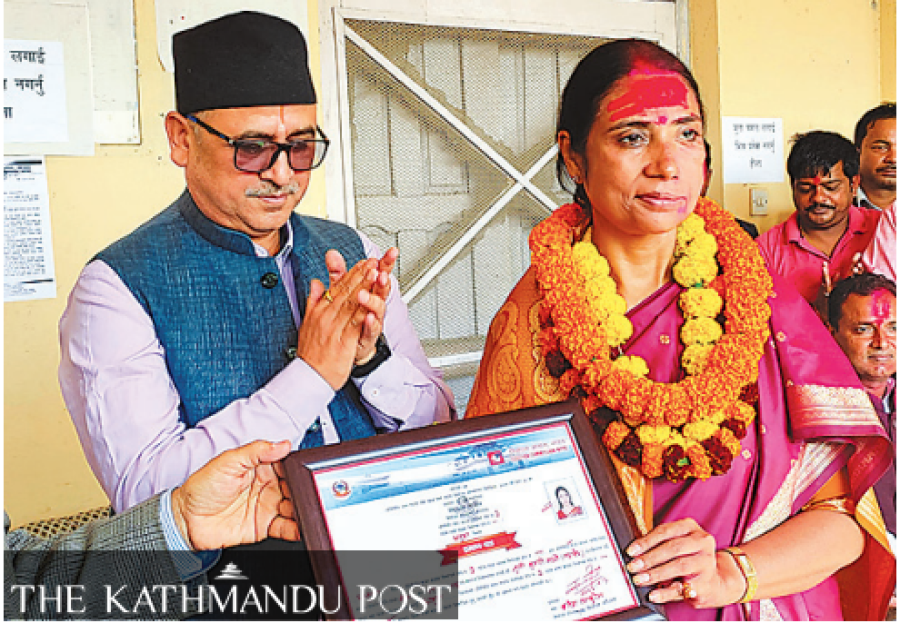Politics
Beating all odds, CPN–UML becomes leading force in Madhesh Province
But split cost the party dearly in Sudurpaschim and Karnali provinces.
Binod Ghimire
As the counting of votes of Sunday’s federal and provincial elections nears conclusion, the CPN-UML looks set to become the second largest party after the Nepali Congress.
The largest leftist party is poised to win some 45 out of the 165 first-past-the-post (FPTP) seats in the House of Representatives and 92 out of the 330 FPTP seats in provincial assemblies. The election results announced so far suggest Lumbini, Province 1 and Gandaki provinces continue to remain the party’s stronghold. The KP Sharma Oli-led party was largely known for having a strong voter base in hill districts and relatively small support in Madhesh.
In the 2017 elections, the party had fared well in Sudur Paschim and Karnali provinces besides Lumbini, Province 1 and Gandaki. But this time, the party has performed poorly in Sudur Paschim and Karnali, but fared excellently in Madhesh.
In the elections five years ago, the UML had won 11 seats in the Sudur Paschim, but this time it has so far won just two seats while the counting in a Bajura seat has yet to begin. In the Sudur Paschim provincial assembly, it had won 17 seats last time, but this time it looks like the party has to be satisfied with just four.
The situation is no better in the Karnali Province. In 2017, the UML became the largest party in the province winning six lower house seats and 14 provincial seats, but now it has not been pushed to the third position—it has won just six provincial assembly seats and not won even a single lower house seat, although the counting in Bajura district has yet to begin.
“Yes we have disappointing results from the two provinces,” Bishnu Rimal, a UML deputy general secretary, told the Post. “It is because the voters of the ruling alliance remained loyal to the coalition, while we were unable to attract even the swing voters. In addition, the ruling parties used all their energies in those provinces.”
Rimal, however, disagrees that the split in the party was responsible for the party’s poor show in the two provinces. The election results, however, suggest otherwise. Out of the 10 lower house seats the Madhav Kumar Nepal-led CPN (Unified Socialist) won this time, six—three each–are from the two provinces. Nepal’s party, which was launched only last year, is a splinter of the CPN-UML.
Political experts believe the impact of the split was visible in Sudur Paschim and Karnali provinces. “The UML suffered due to the split while there was a good vote transfer among the five ruling parties,” Jhalak Subedi, a left-leaning political analyst, told the Post. “UML decision to debar Bhim Rawal from contesting elections also added to the party’s poor performance.”
The results from the Madhesh province, however, have come as a big consolation for the UML this time. The party was often perceived as anti-Madhesi because of Oli’s perceived tough stance against Madhesi issues like citizenship and delineation of boundaries of provinces. Ahead of the 2017 elections, several Madhesh-based parties had even disrupted Oli’s election campaign in the province.
The situation has changed markedly for the party’s good this time. The UML is competing with the Nepali Congress, which historically had a strong hold in Madhesh, to claim the first position in terms of the lower house FPTP seats won. While the Congress has won eight lower house FPTP seats here, the UML has won seven such seats while counting in one seat is continuing.
In the Madhes provincial assembly, the UML has won eleven seats and is leading in three others to become the largest party. “We expected to win more, but Prabhu Sah played a spoiler,” said Rimal. The party had won just two lower house seats from Madhesh five years ago.
Prabhu Sah and Kiran Kumar Sah won from Rautahat constituency 3 and 2 respectively. They had rejected the tickets offered by the CPN-UML.
Experts say the negativity against Oli has decreased over the years while the party has gained the voter base by inducting Madhesh party leaders into its fold. “Many influential leaders from different parties have joined the UML increasing its voter base,” said Subedi.
Tula Narayan Shah, a political analyst, says the UML’s performance has been better than expected this time. He says the party, after the split, joined hands with several Madheshi leaders ahead of the local polls and its partnership with the Janata Samajbadi Party for the federal and provincial elections paid back hugely.
“The UML is becoming a decisive force in Madhesh,” he told the Post.




 13.12°C Kathmandu
13.12°C Kathmandu














